Daniel Felsenthal at the LARB:
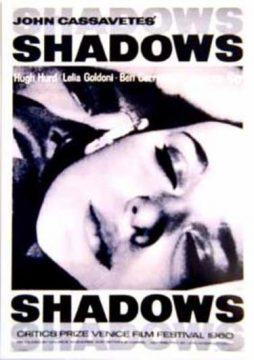 Cassavetes felt galvanized by the looseness and freedom he (mis)read into jazz, which enabled him to make a film with little knowledge or money. At the very least, he shared one quality with Mingus — an ability to bully the people he worked with into doing what he wanted them to do. In a functional sense, both the radical filmmaker and the radical jazz composer were as domineering and rigid as the mainstream structures they railed against.
Cassavetes felt galvanized by the looseness and freedom he (mis)read into jazz, which enabled him to make a film with little knowledge or money. At the very least, he shared one quality with Mingus — an ability to bully the people he worked with into doing what he wanted them to do. In a functional sense, both the radical filmmaker and the radical jazz composer were as domineering and rigid as the mainstream structures they railed against.
When Shadows premiered at New York’s Paris Theater in 1958, Cassavetes and most of the attendees considered it a complete failure. Mingus was so mad about the music that he stormed out of the theater and told a fawning photographer to go fuck himself. An early and important champion, Jonas Mekas raved about the film in The Village Voice, writing that it had the power to “influence and change the tone, subject matter, and style of the entire independent American cinema.” Cassavetes spent an exhausting year reworking the movie, before it premiered again at the very end of 1959.
more here.
Joe Moran at The Guardian:
 Each chapter explodes a common myth about language. Shariatmadari begins with the most common myth: that standards of English are declining. This is a centuries-old lament for which, he points out, there has never been any evidence. Older people buy into the myth because young people, who are more mobile and have wider social networks, are innovators in language as in other walks of life. Their habit of saying “aks” instead of “ask”, for instance, is a perfectly respectable example of metathesis, a natural linguistic process where the sounds in words swap round. (The word “wasp” used to be “waps” and “horse” used to be “hros”.) Youth is the driver of linguistic change. This means that older people feel linguistic alienation even as they control the institutions – universities, publishers, newspapers, broadcasters – that define standard English.
Each chapter explodes a common myth about language. Shariatmadari begins with the most common myth: that standards of English are declining. This is a centuries-old lament for which, he points out, there has never been any evidence. Older people buy into the myth because young people, who are more mobile and have wider social networks, are innovators in language as in other walks of life. Their habit of saying “aks” instead of “ask”, for instance, is a perfectly respectable example of metathesis, a natural linguistic process where the sounds in words swap round. (The word “wasp” used to be “waps” and “horse” used to be “hros”.) Youth is the driver of linguistic change. This means that older people feel linguistic alienation even as they control the institutions – universities, publishers, newspapers, broadcasters – that define standard English.
Another myth Shariatmadari dismantles is that foreign languages are full of untranslatable words. This misconception serves to exoticise other nationalities and cultures, making them sound quaint or bizarre.
more here.
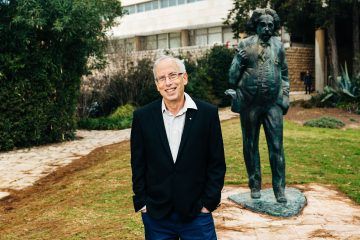 Katia Moskvitch in Quanta:
Katia Moskvitch in Quanta:
Sixteen years ago, on a cold February day at Yale University, a poster caught Gil Kalai’s eye. It advertised a series of lectures by Michel Devoret, a well-known expert on experimental efforts in quantum computing. The talks promised to explore the question “Quantum Computer: Miracle or Mirage?” Kalai expected a vigorous discussion of the pros and cons of quantum computing. Instead, he recalled, “the skeptical direction was a little bit neglected.” He set out to explore that skeptical view himself.
Today, Kalai, a mathematician at Hebrew University in Jerusalem, is one of the most prominent of a loose group of mathematicians, physicists and computer scientists arguing that quantum computing, for all its theoretical promise, is something of a mirage. Some argue that there exist good theoretical reasons why the innards of a quantum computer — the “qubits” — will never be able to consistently perform the complex choreography asked of them. Others say that the machines will never work in practice, or that if they are built, their advantages won’t be great enough to make up for the expense.
Kalai has approached the issue from the perspective of a mathematician and computer scientist. He has analyzed the issue by looking at computational complexity and, critically, the issue of noise. All physical systems are noisy, he argues, and qubits kept in highly sensitive “superpositions” will inevitably be corrupted by any interaction with the outside world. Getting the noise down isn’t just a matter of engineering, he says. Doing so would violate certain fundamental theorems of computation.
More here.
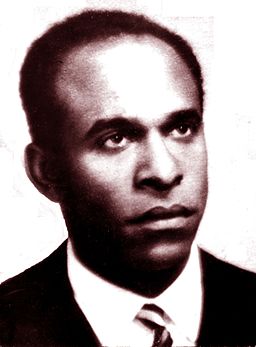 Thomas Meaney in The American Historical Review:
Thomas Meaney in The American Historical Review:
THE IMAGE IS NOT lacking in irony: Frantz Fanon, the intellectual father of Third World revolution, lying in a Maryland hospital bed, watched over by a blue-blooded agent of the CIA. It was out of desperation and his lack of success with Soviet doctors, Fanon’s biographer David Macey reports, that Fanon had agreed to American offers to fly him to the United States—“that country of lynchers,” as he called it—for leukemia treatment. The benefit of aiding the figure who wrote of “a murderous and decisive confrontation” between the colonial and the colonized world was not lost on the CIA. The gesture could have been intended to shore up the United States’ anticolonial credentials in the Cold War, and/or to signal the feebleness of radical national liberation movements whose leaders were compromised by relations with U.S. intelligence. Eight years after Fanon’s death in 1961, Joe Alsop made the latter argument when he leaked the story of the circumstances of Fanon’s last hours in his column in the Washington Post. Writing at a low point in America’s war in Vietnam, Alsop, a leading rhapsodist of pro-war opinion, wanted to score a point at the Third World’s expense. “The chief black hero of the New Left,” he gloated, had died “almost literally in the arms of the CIA.” Alsop savored the CIA case officer’s “downright brotherly visits” to Fanon’s bedside. “Altogether,” he wrote, “it is like saying that Che Guevara died, not because of, but despite the best efforts of the Central Intelligence Agency.” Alsop sent his column to Hannah Arendt, a severe critic of Fanon’s thought and style of expression, whose essay “On Violence” Alsop claimed had “inspired” him. “It almost could move one to tender feelings toward the CIA,” Arendt responded. “Seriously, it shows a certain humanity that is consoling.”
More here.
 Quinn Slobodian and William Callison in Dissent:
Quinn Slobodian and William Callison in Dissent:
In 2016, a dramaturge, a career politician, and a retired sociologist met at the Paris-Moskau Restaurant in Berlin to hatch a plan to disrupt the German left. The dramaturge was the fifty-something Bernd Stegemann, a large man in wire-framed glasses with the slumped mien of an eternal graduate student. He worked a five-minute cab ride away at the Berliner Ensemble, a theater company founded by Bertolt Brecht in the same year as socialist East Germany.
The politician was Sahra Wagenknecht, one of the country’s most poised and merciless critics of the status quo. Born in East Germany to an Iranian father and a German mother, Wagenknecht was the parliamentary chairperson of die Linke (the Left) party. Since its 2007 founding, die Linke’s mixture of ex–Social Democrats and former East German communists had polled around 10 percent nationally. Despite her party’s mediocre electoral performance, Wagenknecht had remained one of the most popular politicians in national polls and a fixture on primetime talk shows.
More here.
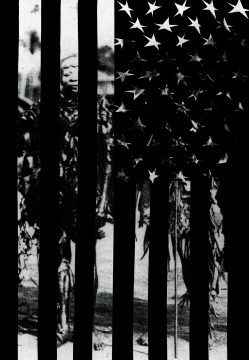 Nikole Hannah-Jones in the NYT:
Nikole Hannah-Jones in the NYT:
[I]t would be historically inaccurate to reduce the contributions of black people to the vast material wealth created by our bondage. Black Americans have also been, and continue to be, foundational to the idea of American freedom. More than any other group in this country’s history, we have served, generation after generation, in an overlooked but vital role: It is we who have been the perfecters of this democracy.
The United States is a nation founded on both an ideal and a lie. Our Declaration of Independence, approved on July 4, 1776, proclaims that “all men are created equal” and “endowed by their Creator with certain unalienable rights.” But the white men who drafted those words did not believe them to be true for the hundreds of thousands of black people in their midst. “Life, Liberty and the pursuit of Happiness” did not apply to fully one-fifth of the country. Yet despite being violently denied the freedom and justice promised to all, black Americans believed fervently in the American creed. Through centuries of black resistance and protest, we have helped the country live up to its founding ideals.
More here.
Paul Street in Counterpunch:
For revolting barbarity and shameless hypocrisy, America reigns without a rival.
– Frederick Douglass, July 4, 1852
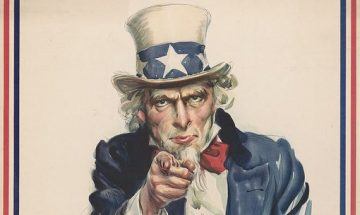 One of the occupational and intellectual hazards of being a historian is that current events often seem far less new to oneself than they do to others. Recently a leftish liberal friend told me that the United States under the Donald Trump had “become a lethal society.” My friend cited the neofascist Trump’s: horrible family separations and concentration camps on the border; openly white-nationalist assaults on four progressive nonwhite and female Congresswomen; real and threatened roundups of undocumented immigrants; fascist-style and hate-filled “Make America Great Again” rallies; encouragement of white supremacist terrorism; alliance with right-wing evangelical Christian fascists.
One of the occupational and intellectual hazards of being a historian is that current events often seem far less new to oneself than they do to others. Recently a leftish liberal friend told me that the United States under the Donald Trump had “become a lethal society.” My friend cited the neofascist Trump’s: horrible family separations and concentration camps on the border; openly white-nationalist assaults on four progressive nonwhite and female Congresswomen; real and threatened roundups of undocumented immigrants; fascist-style and hate-filled “Make America Great Again” rallies; encouragement of white supremacist terrorism; alliance with right-wing evangelical Christian fascists.
Another friend received news of the recent mass-shooting of mostly Latinx Wal-Mart shoppers by racist and nativist white male Trump fan in El Paso, Texas by denouncing Trump’s “fascism” and linking to an essay he’d published about the white-nationalist president’s racist and authoritarian behavior.
I agree with my friends about the lethality of the contemporary United States. I largely share their description of Trump and much of his base as fascist or at least fascistic. “Durable fascist tendencies,” the prolific left political scientist Carl Boggs warns in his important book Fascism Old New: American Politics at the Crossroads, “run deep throughout present-day American society…In the absence of powerful counterforces and a thriving democracy, …those tendencies could morph over into something more expansive and menacing – and Donald Trump could serve, wittingly or unwittingly, as a great historical accelerator.”
It’s nothing to sneeze at. The institutional forms and technologies of militarized surveillance and policing and thought control that are available to fascism-prone elites in the United States are daunting indeed. The United States enjoys historically unprecedented global power on a scale the fascist Third Reich’s leaders dreamed of achieving but never remotely approached.
More here.
James Parker in The Atlantic:
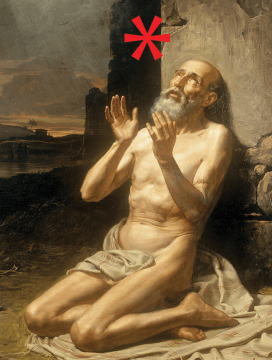 So god says to Satan, “You there, what have you been up to?” And Satan says, “Oh, you know, just hanging around, minding my own business.” And God says, “Well, take a look at my man Job over there. He worships me. He does exactly what I tell him. He thinks I’m the greatest.” “Job?” says Satan. “The rich, happy, healthy guy? The guy with 3,000 camels? Of course he does. You’ve given him everything. Take it all away from him, and I bet you he’ll curse you to your face.” And God says, “You’re on.”
So god says to Satan, “You there, what have you been up to?” And Satan says, “Oh, you know, just hanging around, minding my own business.” And God says, “Well, take a look at my man Job over there. He worships me. He does exactly what I tell him. He thinks I’m the greatest.” “Job?” says Satan. “The rich, happy, healthy guy? The guy with 3,000 camels? Of course he does. You’ve given him everything. Take it all away from him, and I bet you he’ll curse you to your face.” And God says, “You’re on.”
That—give or take a couple of verses—is how it starts, the Book of Job. What a setup. The Trumplike deity; the shrewd and loitering adversary; the cruelly flippant wager; and the stooge, the cosmic straight man, Job, upon whose oblivious head the sky is about to fall. A classic Old Testament skit, pungent as a piece of absurdist theater or a story by Kafka. Job is going to be immiserated, sealed into sorrow—for a bet. What is life? It’s a bleeping and blooping Manichaean casino: You’re up or you’re down, in God’s hands or the devil’s. Piped-in oxygen, controlled light, keep the drinks coming. We, the readers and inheritors of his book, know this. Job, poor bastard, doesn’t.
After his herds have been finished off by marauders and gushes of heavenly fire, and his children have been flattened by falling masonry, and he himself has been covered in running sores from head to toe—after all this happens to the blameless man, he cracks. He sits on an ash heap, seeping and scratching, and reviles the day he was born. “Let that day be darkness,” as the King James Version has it. “Let not God regard it from above, neither let the light shine upon it. Let darkness and the shadow of death stain it; let a cloud dwell upon it; let the blackness of the day terrify it.” Howls of despair are a biblical staple, but Job’s self-curse—the special physics of it, the suicidal pulse that he sends backwards, like a black rainbow, toward the hour of his own conception—is singular. Dispossessed of everything, he is choosing nothing. That first prickle of my existence, the point of light with my name on it? Turn around, All-Fathering One, and eclipse it. Delete.
More here.
Leave this chanting and singing and telling of beads!
Whom dost thou worship in this lonely dark corner of a temple with doors all shut?
Open thine eyes and see thy God is not before thee!
He is there where the tiller is tilling the hard ground
and where the pathmaker is breaking stones.
He is with them in sun and in shower,
and his garment is covered with dust.
Put off thy holy mantle and even like him come down on the dusty soil!
Amy Brand at The MIT Press Reader:
Amy Brand: You have tended to separate your work on language from your political persona and writings. But is there a tension between arguing for the uniqueness of Homo sapiens when it comes to language, on the one hand, and decrying the human role in climate change and environmental degradation, on the other? That is, might our distance from other species be tied up in how we’ve engaged (or failed to engage) with the natural environment?
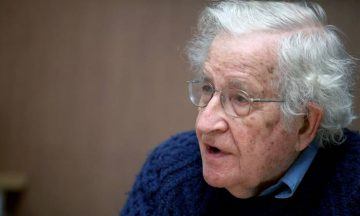 Noam Chomsky: The technical work itself is in principle quite separate from personal engagements in other areas. There are no logical connections, though there are some more subtle and historical ones that I’ve occasionally discussed (as have others) and that might be of some significance.
Noam Chomsky: The technical work itself is in principle quite separate from personal engagements in other areas. There are no logical connections, though there are some more subtle and historical ones that I’ve occasionally discussed (as have others) and that might be of some significance.
Homo sapiens is radically different from other species in numerous ways, too obvious to review. Possession of language is one crucial element, with many consequences. With some justice, it has often in the past been considered to be the core defining feature of modern humans, the source of human creativity, cultural enrichment, and complex social structure.
As for the “tension” you refer to, I don’t quite see it.
More here.
Emily Ogden in Aeon:
 ‘Bunk’ means baloney, hooey, bullshit. Bunk isn’t just a lie, it’s a manipulative lie, the sort of thing a con man might try to get you to believe in order to gain control of your mind and your bank account. Bunk, then, is the tool of social parasites, and the word ‘debunk’ carries with it the expectation of clearing out something that is foreign to the healthy organism. Just as you can deworm a puppy, you can debunk a religious practice, a pyramid scheme, a quack cure. Get rid of the nonsense, and the polity – just like the puppy – will fare better. Con men will be deprived of their innocent marks, and the world will take one more step in the direction of modernity.
‘Bunk’ means baloney, hooey, bullshit. Bunk isn’t just a lie, it’s a manipulative lie, the sort of thing a con man might try to get you to believe in order to gain control of your mind and your bank account. Bunk, then, is the tool of social parasites, and the word ‘debunk’ carries with it the expectation of clearing out something that is foreign to the healthy organism. Just as you can deworm a puppy, you can debunk a religious practice, a pyramid scheme, a quack cure. Get rid of the nonsense, and the polity – just like the puppy – will fare better. Con men will be deprived of their innocent marks, and the world will take one more step in the direction of modernity.
Debunk is a story of modernity in one word – but is it a true story? Here’s the way this fable goes. Modernity is when we finally muster the reason and the will to get rid of all the self-interested deceptions that aristocrats and priests had fobbed off on us in the past. Now, the true, healthy condition of human society manifests itself naturally, a state of affairs characterised by democracy, secular values, human rights, a capitalist economy and empowerment for everyone (eventually; soon). All human beings and all human societies are or ought to be headed toward this enviable situation. Some – and these are often non-Western people, people of faiths other than Christianity, people of colour – have regrettably gotten themselves faced in the wrong direction. They are still ‘barbaric’ or ‘medieval’ or even ‘primitive’. Maybe they are even getting more so. Turns out the debunking will have to continue. We’ll have to keep de-worming on an individual, an institutional, or a geopolitical scale until everyone is all right.
But scholars have been pointing out for some time just how far off this picture is.
More here.
Swaran Singh in Spiked:
 Iftikhar was my favourite taxi driver while I lived in London. An elderly Muslim from Lahore, he spoke in lilting, lyrical Punjabi typical of that part of the world. In June 1999, as India and Pakistan fought the Kargil war, he was driving me to Heathrow when the conversation turned to the conflict. I asked what he thought. ‘Doctor sahib‘, he said, ‘when my mother had me, she was suffering from tuberculosis. She was weak and her milk had dried up. Her nextdoor neighbour was a Sikh woman who had also given birth. My mother asked her to breastfeed me. When you ask me about the war, what can I say? I was born of one mother’s womb; another mother suckled me. How can I choose?’
Iftikhar was my favourite taxi driver while I lived in London. An elderly Muslim from Lahore, he spoke in lilting, lyrical Punjabi typical of that part of the world. In June 1999, as India and Pakistan fought the Kargil war, he was driving me to Heathrow when the conversation turned to the conflict. I asked what he thought. ‘Doctor sahib‘, he said, ‘when my mother had me, she was suffering from tuberculosis. She was weak and her milk had dried up. Her nextdoor neighbour was a Sikh woman who had also given birth. My mother asked her to breastfeed me. When you ask me about the war, what can I say? I was born of one mother’s womb; another mother suckled me. How can I choose?’
I thought of Iftikhar as India and Pakistan are again on the brink. On 5 August 2019, Amit Shah, India’s home affairs minister, announcedin the upper house of the Indian parliament (Rajya Sabha) that a presidential order had been issued revoking Article 370, depriving the state of Jammu and Kashmir of its special status that conferred on it a certain level of autonomy, and fundamentally changing the relationship between India and Kashmir.
The immediate and long-term consequences of this Indian move will be far-reaching, and may be very damaging. No one can foresee the outcome and many will rightly be trepidatious. But at this critical juncture, it is important to realise the complexity of the Indian-Pakistani conflict over Kashmir, and its varied victims. Much of the media portrayal of the conflict is one between a Hindu nationalist India and the Muslim population of Kashmir. This is only partly true.
More here.
Anna Sherman at Literary Hub:
 Tokyo is a city of darkness, a city of light. Each melts into the other. At its center, the city of light blacks out, and at bridges and crossroads, at the margins around train stations, the city of darkness shines, gleaming.
Tokyo is a city of darkness, a city of light. Each melts into the other. At its center, the city of light blacks out, and at bridges and crossroads, at the margins around train stations, the city of darkness shines, gleaming.
In that other city are love-hotel rooms laid out like train carriages where men brush against women pretending to be commuters. And the (now almost extinct) No Panty coffee houses, which appeared overnight and disappeared as quickly, once Tokyo tired of their mirrored floors and the waitresses who served terrible overpriced coffee, wearing short skirts and nothing else. Before the New Public Morals Act outlawed certain excesses of bad taste (such as revolving beds and oversized mirrors), there were cabarets near Shinjuku where women stood behind chicken wire as clients poked fingers through the mesh, straining to touch a rib, a wrist, or whatever they could reach. Rooms where adults could suck on a pacifier and wear diapers. And—most infamous—Lucky Hole, a bar where a man could push himself through an anonymous plywood board while someone invisible on the other side sucked or stroked him.
more here.
Rick Baum at The Point:
 But how can we think of YHWH as indicating a path away from injustice and oppression? One way we might try to understand Amos’s sense of YHWH in the central passages of the chiasmus is with reference to the notion of wonder. Abraham Joshua Heschel, a prominent twentieth-century theologian, rooted his theology in the teaching of the prophets and particularly in his observation that “to the prophets wonder is a form of thinking … it is an attitude that never ceases.” Importantly, for Heschel, wonder is a real-world experience—one that is latent in every person—resulting from even the most mundane aspects of life. “We do not come upon it only at the climax of thinking or in observing strange, extraordinary facts but in the startling fact that there are facts at all: being, the universe, the unfolding of time,” he writes in God in Search of Man. “We may face it at every turn, in a grain of sand, in an atom, as well as in the stellar space.”
But how can we think of YHWH as indicating a path away from injustice and oppression? One way we might try to understand Amos’s sense of YHWH in the central passages of the chiasmus is with reference to the notion of wonder. Abraham Joshua Heschel, a prominent twentieth-century theologian, rooted his theology in the teaching of the prophets and particularly in his observation that “to the prophets wonder is a form of thinking … it is an attitude that never ceases.” Importantly, for Heschel, wonder is a real-world experience—one that is latent in every person—resulting from even the most mundane aspects of life. “We do not come upon it only at the climax of thinking or in observing strange, extraordinary facts but in the startling fact that there are facts at all: being, the universe, the unfolding of time,” he writes in God in Search of Man. “We may face it at every turn, in a grain of sand, in an atom, as well as in the stellar space.”
more here.
T.J. Clark at the LRB:
 The Prophecy pictures were made in tragic circumstances. By 1956 Krasner’s marriage to Jackson Pollock was all but broken. In August that year, while Krasner was in Europe, Pollock’s Oldsmobile came off the road at speed, killing himself and Edith Metzger, a friend of his lover, Ruth Kligman. Kligman survived the crash. The paintings Krasner made in response to the horror – and this is almost always her strength – are deeply engaged with other people’s imagery. Fighting with De Kooning’s Woman, as she does throughout – fighting and feeding on his colour, the scale and shape of his Cubist body parts, his bad faith fascination with Marilyn Monroe gorgeousness (bad faith because his irony is so obviously an alibi for gloating) – is her way of discovering what ‘woman’, that terrifying abstraction, meant for her. Out of the engagement comes the originality. Dripping paint, for example, was already a tired Ab Ex trademark by 1956, by no means De Kooning’s exclusive property. But no one had made dripped paint so unlovely, so impatient and passionless, as Krasner did the pinks and whites in Birth. (The tone of the title is undecidable.) For the fight with De Kooning to end in victory, other painters’ weaponry had to be taken out of the closet, some of it distinctly old-fashioned. Krasner was never up to date. Three in Two, for example, evokes explicitly, and not just in its title, the savage Jungian splitting and swapping of genders that Pollock had gone in for a decade earlier, during the time of Two and Male and Female. Behind those paintings lay Picasso, specifically Les Demoiselles d’Avignon. Krasner was monstrously confident that she could mobilise this big machinery without in the least repeating its moves – or rather, that she could use the moves to deliver an entirely new, and dreadful, sense of closeness and inhumanity. Embrace, for example, is Les Demoiselles churned into viscera.
The Prophecy pictures were made in tragic circumstances. By 1956 Krasner’s marriage to Jackson Pollock was all but broken. In August that year, while Krasner was in Europe, Pollock’s Oldsmobile came off the road at speed, killing himself and Edith Metzger, a friend of his lover, Ruth Kligman. Kligman survived the crash. The paintings Krasner made in response to the horror – and this is almost always her strength – are deeply engaged with other people’s imagery. Fighting with De Kooning’s Woman, as she does throughout – fighting and feeding on his colour, the scale and shape of his Cubist body parts, his bad faith fascination with Marilyn Monroe gorgeousness (bad faith because his irony is so obviously an alibi for gloating) – is her way of discovering what ‘woman’, that terrifying abstraction, meant for her. Out of the engagement comes the originality. Dripping paint, for example, was already a tired Ab Ex trademark by 1956, by no means De Kooning’s exclusive property. But no one had made dripped paint so unlovely, so impatient and passionless, as Krasner did the pinks and whites in Birth. (The tone of the title is undecidable.) For the fight with De Kooning to end in victory, other painters’ weaponry had to be taken out of the closet, some of it distinctly old-fashioned. Krasner was never up to date. Three in Two, for example, evokes explicitly, and not just in its title, the savage Jungian splitting and swapping of genders that Pollock had gone in for a decade earlier, during the time of Two and Male and Female. Behind those paintings lay Picasso, specifically Les Demoiselles d’Avignon. Krasner was monstrously confident that she could mobilise this big machinery without in the least repeating its moves – or rather, that she could use the moves to deliver an entirely new, and dreadful, sense of closeness and inhumanity. Embrace, for example, is Les Demoiselles churned into viscera.
more here.
 Long after most chemists had given up trying, a team of researchers has synthesized the first ring-shaped molecule of pure carbon — a circle of 18 atoms. The chemists started with a triangular molecule of carbon and oxygen, which they manipulated with electric currents to create the carbon-18 ring. Initial studies of the properties of the molecule, called a cyclocarbon, suggest that it acts as a semiconductor, which could make similar straight carbon chains useful as molecular-scale electronic components. It is an “absolutely stunning work” that opens up a new field of investigation, says Yoshito Tobe, a chemist at Osaka University in Japan. “Many scientists, including myself, have tried to capture cyclocarbons and determine their molecular structures, but in vain,” Tobe says. The results appear in Science1 on 15 August.
Long after most chemists had given up trying, a team of researchers has synthesized the first ring-shaped molecule of pure carbon — a circle of 18 atoms. The chemists started with a triangular molecule of carbon and oxygen, which they manipulated with electric currents to create the carbon-18 ring. Initial studies of the properties of the molecule, called a cyclocarbon, suggest that it acts as a semiconductor, which could make similar straight carbon chains useful as molecular-scale electronic components. It is an “absolutely stunning work” that opens up a new field of investigation, says Yoshito Tobe, a chemist at Osaka University in Japan. “Many scientists, including myself, have tried to capture cyclocarbons and determine their molecular structures, but in vain,” Tobe says. The results appear in Science1 on 15 August.
Pure carbon comes in several different forms, including diamond, graphite and ‘nanotubes’. Atoms of the element can form chemical bonds with themselves in various configurations: for example, each atom can bind to four neighbours in a pyramid-shaped pattern, as in diamond; or to three, as in the hexagonal patterns that make up the single-atom-thick sheets of graphene. (Such a three-bond pattern is also found in bulk graphite as well as in carbon nanotubes and in the globular molecules called fullerenes.) But carbon can also form bonds with just two nearby atoms. Nobel-prizewinning chemist Roald Hoffmann at Cornell University in Ithaca, New York, and others have long theorized that this would lead to pure chains of carbon atoms. Each atom might form either a double bond on each side — meaning the adjacent atoms share two electrons — or a triple bond on one side and a single bond on the other. Various teams have attempted to synthesize rings or chains based on this pattern.
More here.
After Van Gogh

I have done with the sun.
Here on these northern
plains wheat fields become
waves, beneath leaden skies,
shadows black of dogs
run through the swaying crop.
Long ago I left another country
where the sulphurous sun
hung low over the potato fields.
They called me a madman
because I wanted to be a
true Christian. In Arles
I painted blossom pure as
drifts of Japanese snow.
Now it is upon me again,
this clamped crown.
I who melted gold into
an alchemy of sunflowers
burnished as a lion’s mane.
Misfortune must be good
for something…
Across the wheat field crows
wheel in a ragged requiem
towards me. My vision
shifts and slides. Three paths
diverge – leading somewhere
going nowhere. My eyes
burn. I cannot hold on.
by Sue Hubbard
from Ghost Station
saltpublishing 2004
Painting:
Vincent Van Gogh
Wheatfield with Crows